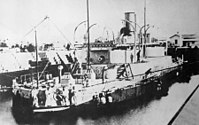| This article needs additional citations for verification. Please help improve this article by adding citations to reliable sources. Unsourced material may be challenged and removed. Find sources: "Breastwork monitor" – news · newspapers · books · scholar · JSTOR (February 2024) (Learn how and when to remove this message) |

A breastwork monitor was a modification of the monitor, a warship which was first built in the United States in 1861, designed by John Ericsson and distinguished by the first rotating gun turret, designed by Theodore Timby. The modified design known as a breastwork monitor was introduced by Sir Edward Reed, the Chief Constructor of the Royal Navy between 1863 and 1870. The original monitors were very stable, and difficult to damage by gunfire, because of their very low freeboard. This, however, caused them to behave, some said, as a "half-tide rock", with the ever-present risk of being swamped in a sea should water gain access to the interior through hatches, turret bases or other openings in the deck.
Reed proposed to overcome this risk by the addition of an armoured breastwork. This was an armoured superstructure of moderate height (7 feet (2.1 m) in HMVS Cerberus), centrally placed on the ship and containing within its armoured circumference the gun turrets, bridge, funnels and all other upper deck appurtenances needed to operate the ship. The presence of this breastwork allowed the ship to operate without fear of being flooded by waves breaking over the deck, and allowed the main armament to be positioned at a greater height than in the American monitors, gaining thereby greater command and range, while preserving the defensive advantage of low freeboard.
Reed's concept was copied by other designers and breastwork monitors served in the French and Imperial Russian Navies, among others.
See also
References
- MacLeod, Ian D; Steyne, Hanna (2011). "Managing a Monitor — the Case of HMVS Cerberus in Port Phillip Bay: Integration of Corrosion Measurements with Site Management Strategies". Conservation and Management of Archaeological Sites. 13 (4): 337. doi:10.1179/175355212X13315728646201.
External links
| Naval ships and warships in 19th and 20th centuries | |
|---|---|
| Aircraft carriers | |
| Battleships | |
| Cruisers | |
| Escort | |
| Transport | |
| Patrol craft | |
| Fast attack craft | |
| Mine warfare | |
| Command and support |
|
| Submarines | |
| Miscellaneous | |
| Related | |
This article about a specific naval ship or boat of the United Kingdom is a stub. You can help Misplaced Pages by expanding it. |